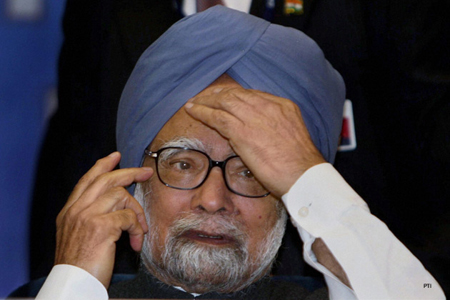
New Delhi, Jan 19: India Friday welcomed the "positive statements" coming from Pakistan on talks to defuse their border tension and said the border flare-ups of the past 10 days, including the Jan 8 brutal killing of two Indian soldiers, would not undermine their peace process.
The statement by External Affairs Minister Salman Khurshid came even as Congress president Sonia Gandhi said India was for close relations with neighbours but the dialogue must be based on "accepted principles of civilized behaviour", while Prime Minister Manmohan Singh said India must have friendly relations with all but did not elaborate.
A day after Pakistan Foreign Minister Hina Rabbani Khar offered talks at the foreign ministers level to defuse the stand-off, the country's envoy in New Delhi Salman Bashir condemned the Jan 8 brutal killing of two Indian soldiers, including the beheading of one, and their two armies should probe the incident.
But Bashir stated that "We are absolutely clear, that at no point in time did Pakistani forces cross the LoC."
In an interview to NDTV news channel, Bashir, taking note of the stern Indian stance, said: "Unfortunately, I must say that it has almost become fashionable, that Pakistan-bashing has become fashionable whenever there is an issue."
Former Pakistan president Pervez Musharraf, in an interview to TimesNow news channel, said he could not believe that Pakistani soldiers could have crossed the LoC and killed and beheaded Indian soldiers.
"I just can't imagine any soldier doing this. If anyone has done it the strongest punishment should be given to him," Musharraf said.
He termed the beheading of an Indian soldier as a "terrible, wild act" and said anyone found guilty would be court martialled and punished. Musharraf said peace must prevail on the border and the escalation of violence was not in anyone's interest.
India maintains that Pakistani forces killed Naik Hemraj Singh, whose head is still missing, and killed and mutilated Lance Naik Sudhakar Singh - 600 metres inside Indian territory on the LoC that divides Kashmir between India and Pakistan.
Addressing the Congress party's Chintan Baithak in Jaipur, Sonia Gandhi said closer relations with immediate neighbours would promote regional peace, and in a tough posture, added: "However, let us be clear. Our dialogue must be based on accepted principles of civilized behaviour. We will never compromise on our vigil and preparedness to deal with terrorism and threats on our borders."
The prime minister's statement came in an intervention he made during a discussion on foreign affairs at the Congress meet when some party members made statements critical of Pakistan.
Khurshid, speaking in Jaipur, said India would give an "appropriate response" to the Pakistan offer of talks. He said the matter would come up for discussion at the three-day Congress Chintan Shivir.
India has not yet responded to Pakistan's offer for talks, an informed source told IANS.
The India-Pakistan border has been peaceful since Wednesday after their respective armies decided to adhere to the 2003 ceasefire and exercise restraint.
The border flare-up since Jan 6, when a Pakistani soldier was killed in alleged Indian firing, and the Jan 8 killing of two Indian soldiers, had led to a bitter stand-off between the two countries with India saying on Tuesday that there could not be "business as usual" with Pakistan.
Indian Army chief General Bikram Singh, during a visit to the house of Lance Naik Sudhakar Singh in Madhya Pradesh, said "things are under control" on the LoC.
He also appealed to media not to politicise the killing of Indian soldiers






Comments
Add new comment